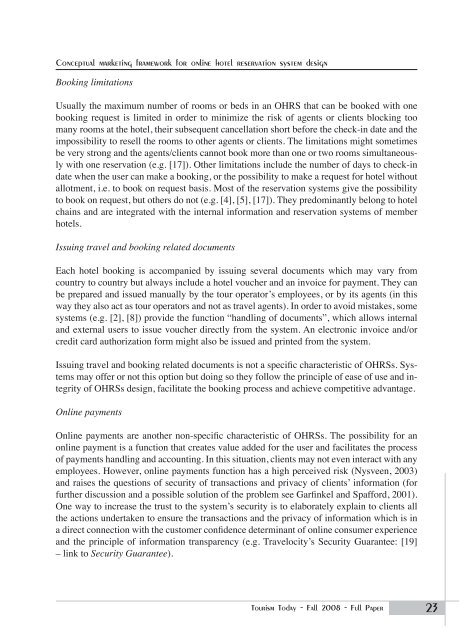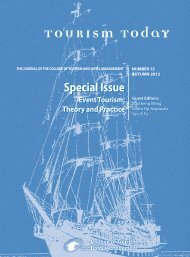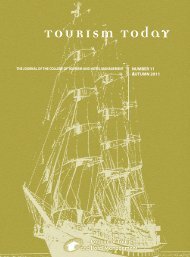Tourism Today - College of Tourism and Hotel Management
Tourism Today - College of Tourism and Hotel Management
Tourism Today - College of Tourism and Hotel Management
- TAGS
- tourism
- cothm.ac.cy
Create successful ePaper yourself
Turn your PDF publications into a flip-book with our unique Google optimized e-Paper software.
Conceptual marketing framework for online hotel reservation system design<br />
Booking limitations<br />
Usually the maximum number <strong>of</strong> rooms or beds in an OHRS that can be booked with one<br />
booking request is limited in order to minimize the risk <strong>of</strong> agents or clients blocking too<br />
many rooms at the hotel, their subsequent cancellation short before the check-in date <strong>and</strong> the<br />
impossibility to resell the rooms to other agents or clients. The limitations might sometimes<br />
be very strong <strong>and</strong> the agents/clients cannot book more than one or two rooms simultaneously<br />
with one reservation (e.g. [17]). Other limitations include the number <strong>of</strong> days to check-in<br />
date when the user can make a booking, or the possibility to make a request for hotel without<br />
allotment, i.e. to book on request basis. Most <strong>of</strong> the reservation systems give the possibility<br />
to book on request, but others do not (e.g. [4], [5], [17]). They predominantly belong to hotel<br />
chains <strong>and</strong> are integrated with the internal information <strong>and</strong> reservation systems <strong>of</strong> member<br />
hotels.<br />
Issuing travel <strong>and</strong> booking related documents<br />
Each hotel booking is accompanied by issuing several documents which may vary from<br />
country to country but always include a hotel voucher <strong>and</strong> an invoice for payment. They can<br />
be prepared <strong>and</strong> issued manually by the tour operator’s employees, or by its agents (in this<br />
way they also act as tour operators <strong>and</strong> not as travel agents). In order to avoid mistakes, some<br />
systems (e.g. [2], [8]) provide the function “h<strong>and</strong>ling <strong>of</strong> documents”, which allows internal<br />
<strong>and</strong> external users to issue voucher directly from the system. An electronic invoice <strong>and</strong>/or<br />
credit card authorization form might also be issued <strong>and</strong> printed from the system.<br />
Issuing travel <strong>and</strong> booking related documents is not a specific characteristic <strong>of</strong> OHRSs. Systems<br />
may <strong>of</strong>fer or not this option but doing so they follow the principle <strong>of</strong> ease <strong>of</strong> use <strong>and</strong> integrity<br />
<strong>of</strong> OHRSs design, facilitate the booking process <strong>and</strong> achieve competitive advantage.<br />
Online payments<br />
Online payments are another non-specific characteristic <strong>of</strong> OHRSs. The possibility for an<br />
online payment is a function that creates value added for the user <strong>and</strong> facilitates the process<br />
<strong>of</strong> payments h<strong>and</strong>ling <strong>and</strong> accounting. In this situation, clients may not even interact with any<br />
employees. However, online payments function has a high perceived risk (Nysveen, 2003)<br />
<strong>and</strong> raises the questions <strong>of</strong> security <strong>of</strong> transactions <strong>and</strong> privacy <strong>of</strong> clients’ information (for<br />
further discussion <strong>and</strong> a possible solution <strong>of</strong> the problem see Garfinkel <strong>and</strong> Spafford, 2001).<br />
One way to increase the trust to the system’s security is to elaborately explain to clients all<br />
the actions undertaken to ensure the transactions <strong>and</strong> the privacy <strong>of</strong> information which is in<br />
a direct connection with the customer confidence determinant <strong>of</strong> online consumer experience<br />
<strong>and</strong> the principle <strong>of</strong> information transparency (e.g. Travelocity’s Security Guarantee: [19]<br />
– link to Security Guarantee).<br />
<strong>Tourism</strong> <strong>Today</strong> - Fall 2008 - Full Paper<br />
23





